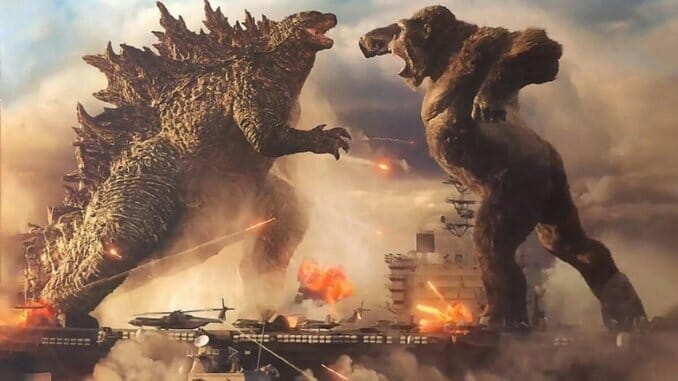Godzilla vs. Kong Thankfully Lets Them Fight
Photos via Legendary Pictures
Be sure to check out our ranking of every single Godzilla movie for more kaiju action.
There’s a moment, somewhere in the middle of the second major confrontation between the titanic title characters of Godzilla vs. Kong, that may correlate nicely with how fans of both series ultimately feel about this movie. The two giant creatures are busy making good on the title of director Adam Wingard’s latest installment in Legendary Pictures’ MonsterVerse, impressively brawling in a crowded city, and a blast of Godzilla’s trademark atomic breath has just put the giant ape on the ropes. The camera then cuts to an extreme close-up of Godzilla’s face … and he proceeds to put on the most absurdly and undeniably human expression I’ve ever seen plastered across the countenance of a movie kaiju. It’s a condescending smirk, delivered to a foe he sees as beneath him—the face an internet troll would make as he fires up another comment beginning with “actually…” It’s a moment of (dickish) human-like personality that seems entirely outside the American Godzilla character first established in Gareth Edwards’ moody 2014 reboot, and whether you’re willing to accept this goofball of a Godzilla in Wingard’s film is as good a test as any to gauge how you’ll feel about Godzilla vs. Kong as a whole. For better or worse, this movie is no more and no less than the title implies.
Not that we were expecting anything else, because from the very beginning this has been a very consistently presented, straightforward film. The superlative but misleading first trailer for 2019’s King of the Monsters seemed to promise a film of operatic depth, grandeur and solemnity—suffice to say, it turned out to be pretty much the opposite, being bombastic and absurd in the extreme. Godzilla vs. Kong, in contrast, never obfuscates that its primary reason for existence is to watch these two icons repeatedly smash against each other. And to get it on the record right now: Yes, this title fight does have a proper “winner,” which is the ideal outcome rather than just making the contest a draw intended to “make both look good.” Judged purely on the promises made by the title, it’s hard to see Godzilla vs. Kong as anything but a success.
As a film, on the other hand, Wingard’s G v. K often still feels like it’s held together with copious amounts of cinematic duct tape. The smirk mentioned above is memorable, and it’s 100% guaranteed to be heading as a stock .gif reaction to a Twitter conversation near you, but any time the monsters aren’t on screen this story is hamstrung by an overabundance of its paper-thin human characters. Even as the shortest of the MonsterVerse movies to date, it still manages to feel interminable at times, especially in its first half. The best thing you can say for the first 50% is that it doesn’t manage to undo the simple pleasures of watching its last third, much as it might try.
This is of course nothing new—the Legendary MonsterVerse films have often struggled with their human characters, and have developed a bad habit of killing off the only interesting ones while sparing the dullards. First it was Bryan Cranston’s paranoiac Joe Brody who was sacrificed in Gareth Edwards’ Godzilla, which left us with vanilla leading man Aaron Taylor-Johnson to pick up his slack. Then King of the Monsters killed off the only member of the scientist/Monarch team of real interest, Ken Watanabe’s doggedly dramatic Dr. Ishiro Serizawa, of “let them fight” fame. Both would be easier to swallow if there were other interesting humans waiting in the wings, but instead almost everyone else comes out feeling like a placeholder.
Part of this is an issue of simply too many characters for a human plot that just doesn’t require many of them, which simply dilutes them all in the process. It’s a laundry list of recognizable, talented actors: Kyle Chandler, Rebecca Hall, Alexander Skarsgård, Millie Bobby Brown, Brian Tyree Henry, Demián Bichir, Eiza González, Shun Oguri, Julian Dennison and more, but there’s no time to go anywhere with any of them. All of them, for their own reasons, ultimately want to find the MacGuffin that is a new “Hollow Earth energy source” that might be used to control or defeat Godzilla, who has been on the warpath for reasons unknown. Could it have something to do with the sketchy cybernetics company we’re made to understand from the opening moments represents the very worst of human evil? Not since Robocop’s Omni Consumer Products has there been a more obviously and unabashedly evil-looking corporation.
-

-

-

-

-

-

-

-

-

-

-

-

-

-

-

-

-

-

-

-

-

-

-

-

-

-

-

-

-

-

-

-

-

-

-

-

-

-

-

-








































